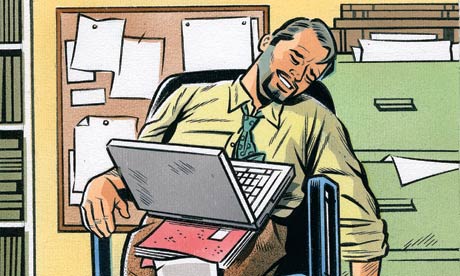
I hereby announce the formation of an international campaign to eliminate all future uses of the phrase, "Work smarter, not harder." It's a mission I'm undertaking with some regret, since the idea behind that annoying slogan is fundamentally a decent one: in our overworked era, who wouldn't be in favour of finding ways to get the same amount done in fewer hours, freeing up time to relax, socialise or nurture the soul? Besides, this column has championed many such techniques in the past. But "Work smarter, not harder" has reached pandemic proportions. It's everywhere in business books and blog posts; it's been recommended as the solution to the problems facing everyone from doctors to police officers. And it's infected domains beyond work: there are books on studying smarter, not harder, on working out smarter, not harder, on cleaning, seducing women, grooming your pet, gardening, even reading the Bible smarter, not harder. Not all at once, obviously, though if you could figure out a way to do that, nobody could fault you for inefficiency.
There's a clue to the problem in that slick and showy word "smart". As the cyber-sceptic Evgeny Morozov pointed out this month, in an article at edge.org, Silicon Valley loves nothing more than proposing "smart" solutions to problems such as crime, voter apathy or climate change. Yet the word blurs a crucial distinction: a smart solution may be ingenious, but it doesn't follow that implementing it will necessarily be for the best. We can persuade people to vote, some techno-reformers argue, using clever incentives, such as shopping discounts or video game-style prizes. But should we, if it risks coarsening democracy, eroding the role of argument and deliberation in persuading people to vote? The answer may be "yes", of course. But Morozov's point is that we fail to ask such questions in the first place.
When it comes to "working smarter", the same kind of problem arises: what if doing things more "efficiently", in a superficial sense, results in doing them worse? There's evidence to suggest that we need to daydream; perhaps we also need those moments of afternoon lassitude and aimless conversations by the office microwave. Creative work, especially, depends on a kind of inefficiency. Inevitably, the scandal and schadenfreude surrounding Jonah Lehrer's book Imagine has all but drowned out its fundamental insight, but it's a good one: creative breakthroughs depend on being stumped and feeling frustrated. Make the path to them too smooth, and you get lower-quality breakthroughs.
The other, more pressing hazard concerns what you'll do with all the time you free up by working smarter: the chances are you – or your boss – will simply fill it with more work. This is the problem with most "smarter, not harder" advice: it's great on the working-more-efficiently part, but it assumes that working less hard will follow automatically. In reality, it won't. So what's the answer? On one level, it's a question of techniques: scheduling specific social activities starting soon after work, say, to ensure your increased efficiency pays off in increased leisure. But on another level, the demand for ever more output is structural, built into our jobs and the economy. Clever techniques alone won't change that. And so the danger is that we just work smarter and harder. And harder, and harder, until we've no time left for seducing Bible-reading gardeners at all.
oliver.burkeman@theguardian.com
Follow Oliver on Twitter.

